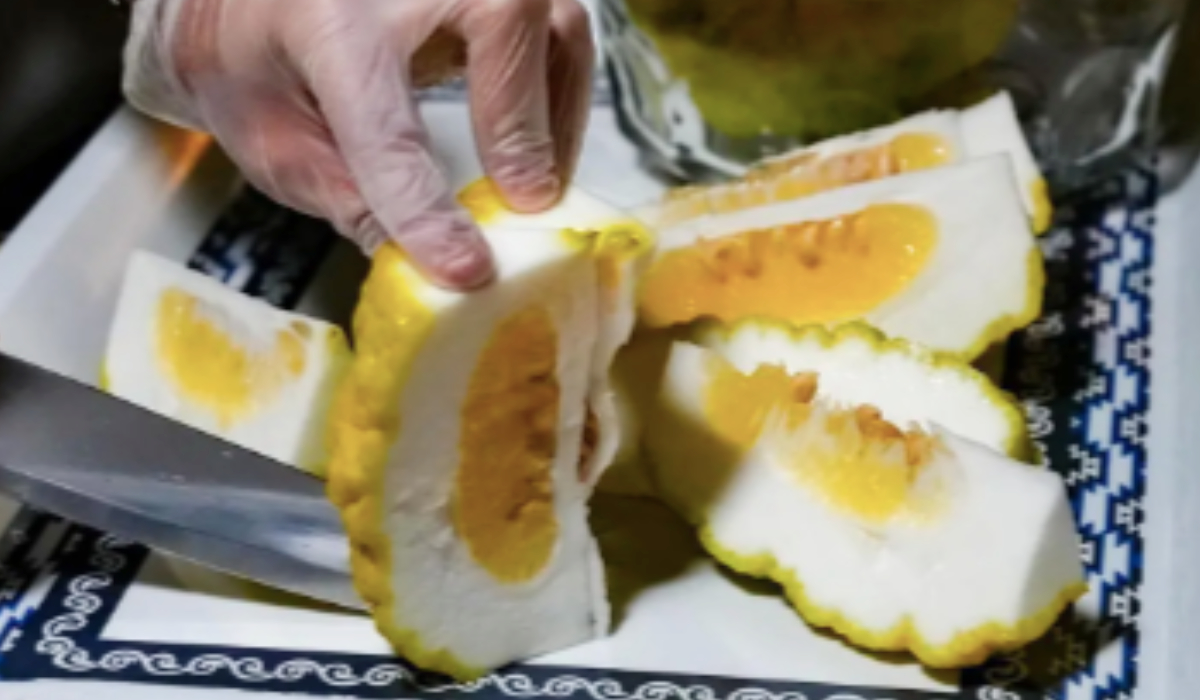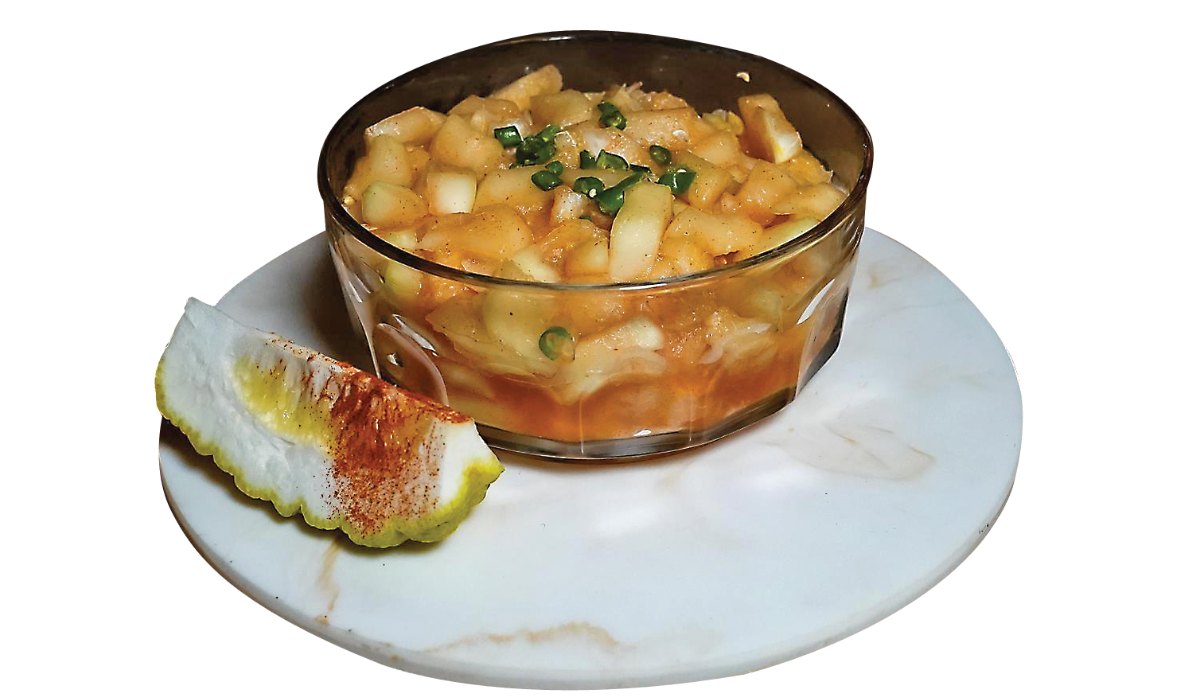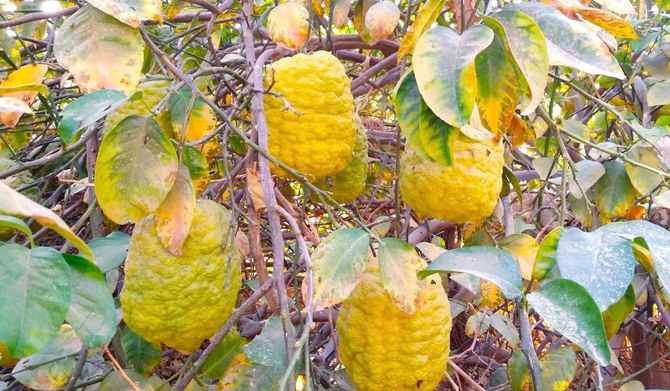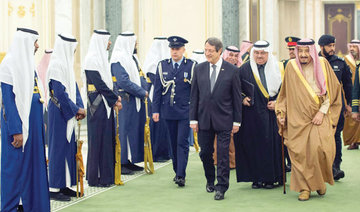JEDDAH: In winter, citron, known as etrinj, returns to Saudi homes from the Kingdom’s farms, bringing with it myriad health benefits and a distinct flavor that in some regions has crafted a culinary tradition of its own.
The fruit is farmed in Jouf in the north, Wadi Al-Dawasir in Najr, and Al-Ahsa in the Eastern Province.
Part of the larger citrus family, citron particularly thrives in Jouf due to its favorable climate, water availability, and fertile land, making it one of the region’s most prevalent trees alongside olives and palms. Citron also stands out as a key agricultural crop in Al-Ahsa farms.

Citron is a versatile fruit that has found its way into many Saudi traditional dishes, juices, and drinks. (SPA)
Mubarak Al-Khanajer, a farmer in Wadi Al-Dawasir, told Arab News: “The citron fruit belongs to the citrus family, and it is usually harvested in January and February, making it a winter fruit that the locals are accustomed to in this season.”
HIGHLIGHTS
• Citron is farmed in Jouf in the north, Wadi Al-Dawasir in Najr, and Al-Ahsa in the Eastern Province.
• Farmers sell it with prices ranging from SR15 ($4) to SR20 for a basket of 10 to 12 fruits.
• In Jouf, locals enjoy citron tea during winter, prepared by peeling, extracting pulp, and infusing it in hot water with sugar, saffron, or without additives.
He noted that the success of citron farming in the region was due to climatic factors including temperature, relative humidity, light, and wind, adding that temperature was one of the most important factors determining the success of citron farming, in addition to the type of land, whether loamy yellow or heavy clay free from harmful salts.
Agricultural technician Abdulrahman Al-Sweis told Arab News that it was important for the crop to receive good agricultural care and be in a sunny area well-protected from the wind and planted in a spacious field.

Citron is a versatile fruit that has found its way into many Saudi traditional dishes, juices, and drinks. (SPA)
He pointed out that the citron fruit was popular for its qualities and was part of the Saudi cultural heritage, adding that there was more awareness about it now through social media.
He said: “Many have started using it as a treatment to face winter diseases due to its richness in vitamins that increase the body’s immunity.”
Gifting the fruit to relatives, friends, and neighbors during harvesting season has been a cultural tradition in the Kingdom. However, the practice has diminished as some opt to sell their harvest, driven by its increasing popularity owing to its significant health benefits.

Citron is a versatile fruit that has found its way into many Saudi traditional dishes, juices, and drinks. (SPA)
Coming in yellow, green, and occasionally orange hues, citron’s larger size, mild acidity, and delicious taste make it akin to a lemon. Packed with antioxidants, vitamins, fibers, calcium, zinc, selenium, manganese, and potassium, it boasts numerous nutritional and health benefits.
The versatile fruit has found its way into many Saudi traditional dishes, juices, and drinks. In Jouf and Al-Ahsa, residents relish preparing marisah, a mix of citron squares with chili, turmeric, mint, and optional additions of salt, dates, or sugar. Some enjoy it sliced or as a jam.
Mohammed Al-Masn, a farmer, said that some locals eat it or make a juice or jam from it. On the diversity of dishes that incorporate the fruit, he added: “The residents of the province do not make citron marisah as in some areas in the north of the Kingdom … they make Al-Wadma which is unique to Al-Ahsa.”

Citron is a versatile fruit that has found its way into many Saudi traditional dishes, juices, and drinks. (SPA)
Al-Wadma is a traditional Hassawi dish, made of dried small fish and citron juice, accompanied by radish, green onions, and lettuce. The fish is either ground or crushed before being combined with citron juice and pieces of citron. After letting it sit for some time, it is eaten with radish leaves.
In Jouf, locals enjoy citron tea during winter, prepared by peeling, extracting pulp, and infusing it in hot water with sugar, saffron, or without additives. Citron juices, featuring various flavors such as turmeric, ginger, and mint, are also popular.
While citron was traditionally not commercialized, recent years have seen some farmers sell it, with prices ranging from SR15 ($4) to SR20 for a basket of 10 to 12 fruits.
Al-Masn pointed out that the citron plant was also suitable for indoor cultivation.
He said: “Ensure the pot is positioned near a window receiving ample sunlight to maintain a temperature above 18 degrees Celsius. When spring concludes, the pot can be moved outdoors permanently and then returned indoors during autumn. This plant can also be seamlessly integrated into home garden settings.”
































